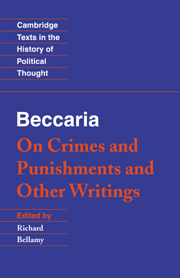Book contents
- Frontmatter
- Contents
- Acknowledgements
- Introduction
- Chronology
- Biographical glossary
- Note on the texts
- Bibliographical note
- On Crimes and Punishments
- Frontispiece
- To the Reader
- Introduction
- 1 The origin of punishment
- 2 The right to punish
- 3 Consequences
- 4 The interpretation of the laws
- 5 The obscurity of the laws
- 6 The proportion between crimes and punishments
- 7 Errors in the measuring of punishments
- 8 The classification of crimes
- 9 Of honour
- 10 Of duels
- 11 Public peace
- 12 The purpose of punishment
- 13 Of witnesses
- 14 Evidence and forms of judgement
- 15 Secret denunciations
- 16 Of torture
- 17 Of the exchequer
- 18 Of oaths
- 19 Of prompt punishments
- 20 Violent crimes
- 21 The punishment of the nobility
- 22 Theft
- 23 Public disgrace
- 24 Parasites
- 25 Banishment and confiscations
- 26 Family feeling
- 27 Lenience in punishing
- 28 The death penalty
- 29 Of detention awaiting trial
- 30 Trials and prescriptions
- 31 Crimes difficult to prove
- 32 Suicide
- 33 Smuggling
- 34 Of debtors
- 35 Asylums
- 36 On setting a price on men's heads
- 37 Attempted crimes, accomplices and immunity
- 38 Leading interrogations, depositions
- 39 Of a particular kind of crime
- 40 False ideas of utility
- 41 How to prevent crimes
- 42 The sciences
- 43 Magistrates
- 44 Public awards
- 45 Education
- 46 Pardons
- 47 Conclusion
- To Jean Baptiste d'Alembert
- To André Morellet
- Inaugural Lecture
- Reflections on the Barbarousness and the Civilisation of Nations and on the Savage State of Man
- Reflections on Manners and Customs
- On Luxury
- Index
- Cambridge Texts in the History of Political Thought
20 - Violent crimes
Published online by Cambridge University Press: 05 June 2012
- Frontmatter
- Contents
- Acknowledgements
- Introduction
- Chronology
- Biographical glossary
- Note on the texts
- Bibliographical note
- On Crimes and Punishments
- Frontispiece
- To the Reader
- Introduction
- 1 The origin of punishment
- 2 The right to punish
- 3 Consequences
- 4 The interpretation of the laws
- 5 The obscurity of the laws
- 6 The proportion between crimes and punishments
- 7 Errors in the measuring of punishments
- 8 The classification of crimes
- 9 Of honour
- 10 Of duels
- 11 Public peace
- 12 The purpose of punishment
- 13 Of witnesses
- 14 Evidence and forms of judgement
- 15 Secret denunciations
- 16 Of torture
- 17 Of the exchequer
- 18 Of oaths
- 19 Of prompt punishments
- 20 Violent crimes
- 21 The punishment of the nobility
- 22 Theft
- 23 Public disgrace
- 24 Parasites
- 25 Banishment and confiscations
- 26 Family feeling
- 27 Lenience in punishing
- 28 The death penalty
- 29 Of detention awaiting trial
- 30 Trials and prescriptions
- 31 Crimes difficult to prove
- 32 Suicide
- 33 Smuggling
- 34 Of debtors
- 35 Asylums
- 36 On setting a price on men's heads
- 37 Attempted crimes, accomplices and immunity
- 38 Leading interrogations, depositions
- 39 Of a particular kind of crime
- 40 False ideas of utility
- 41 How to prevent crimes
- 42 The sciences
- 43 Magistrates
- 44 Public awards
- 45 Education
- 46 Pardons
- 47 Conclusion
- To Jean Baptiste d'Alembert
- To André Morellet
- Inaugural Lecture
- Reflections on the Barbarousness and the Civilisation of Nations and on the Savage State of Man
- Reflections on Manners and Customs
- On Luxury
- Index
- Cambridge Texts in the History of Political Thought
Summary
Some crimes are assaults on persons, others are offences against goods. The former should always be punished with corporal punishment: the rich and the powerful should not be able to put a price on assaults on the weak and the poor; otherwise wealth, which is the reward of industry under the protection of the laws, feeds tyranny. There is no freedom when the laws permit a man in some cases to cease to be a person and to become a thing:, then you will see the efforts of the powerful devoted to discovering from amongst the mass of civil relations those in which the law most favours his interests. The discovery of these is the magic secret which turns citizens into beasts of burden and which, in the hands of the strong, becomes the chain by which the actions of the rash and the weak are shackled. And it is the reason why, in some states which have all the appearance of being free, tyranny is hidden or worms its way unforeseen into a corner neglected by the lawgiver and gathers strength and grows unobserved. Men generally build the most solid bulwarks against open tyranny, but they do not see the tiny insect which gnaws away at them and opens a path for the river's flood that is the more sure for being concealed.
- Type
- Chapter
- Information
- Publisher: Cambridge University PressPrint publication year: 1995



